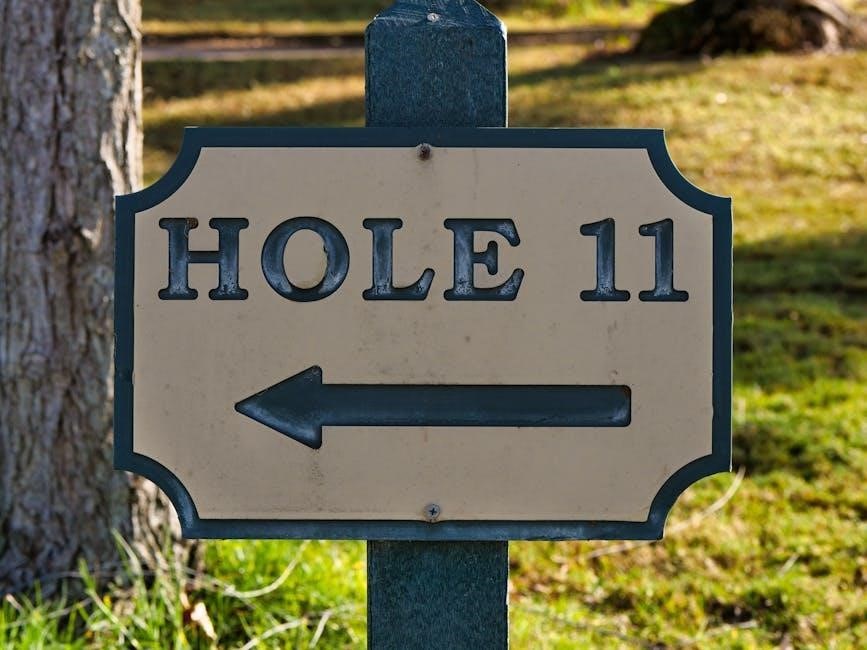monopoly game instructions pdf
Discover the official Monopoly game instructions in PDF format‚ providing a comprehensive guide to understanding rules‚ setup‚ and gameplay. Learn strategies‚ classic rules‚ and how to master the game.
Overview of the Game
Monopoly is a classic board game where players aim to become the wealthiest by buying‚ renting‚ and selling properties. The game includes a board‚ tokens‚ dice‚ 32 houses‚ and 12 hotels. Designed for 2 to 8 players aged 8 and above‚ it typically lasts 60 to 90 minutes. Strategy and negotiation are key to success. This economic simulation is perfect for family game nights and competitive fun.
Importance of Following Official Rules
Adhering to the official Monopoly rules ensures a fair and balanced experience for all players. It prevents disputes‚ maintains game integrity‚ and guarantees everyone understands their responsibilities. Official rules provide clear guidelines for buying properties‚ collecting rent‚ and managing finances. They also outline procedures for special spaces like “Free Parking” and “Go to Jail.” By following these rules‚ players can enjoy a seamless and competitive game‚ keeping the essence of Monopoly intact for generations of players.

Number of Players and Age Recommendations
Monopoly is recommended for 2-8 players aged 8 and up‚ ensuring fun for various group sizes while promoting strategic thinking and healthy family competition.
Minimum and Maximum Number of Players
Monopoly requires a minimum of 2 players and a maximum of 8 players. Each player selects a token and participates in buying‚ trading‚ and managing properties. The game is designed for players aged 8 and above‚ ensuring strategic thinking and fair competition. A Banker is chosen to handle financial transactions‚ keeping personal funds separate from the Bank. This setup ensures smooth gameplay and equal opportunities for all participants to succeed. The game is ideal for family gatherings or group activities.
Recommended Age Range
The Monopoly game is recommended for players aged 8 years and older. This age range ensures players can understand the strategic aspects of buying‚ renting‚ and selling properties. The game is an excellent choice for family gatherings‚ promoting financial management and competitive thinking. It’s designed to be engaging for both children and adults‚ making it a versatile option for various group settings. The complexity of the game makes it suitable for players who can handle strategic planning and decision-making.
Equipment Required for the Game
The Monopoly game includes a game board‚ tokens‚ dice‚ property cards‚ Chance and Community Chest cards‚ houses‚ hotels‚ and play money.
Components of the Monopoly Game
The Monopoly game includes a game board‚ featuring properties‚ railroads‚ and special spaces. Players choose tokens like a top hat or iron to represent them. The game requires dice for moving‚ property cards for ownership‚ and Chance and Community Chest cards for random events. Additionally‚ the set includes houses and hotels to build on properties‚ and play money for transactions. These components are essential for gameplay and strategy.
Understanding the Game Board
The Monopoly game board features a grid layout with properties‚ railroads‚ and special spaces like Free Parking and Go to Jail. The board is divided into sections‚ including GO‚ In Jail‚ and Free Parking‚ which serve unique purposes. Properties are grouped by color‚ representing different values and rental income. The board also includes Chance and Community Chest spaces‚ which trigger card draws. Understanding the board’s layout is crucial for navigating the game and making strategic decisions effectively.
Setting Up the Game
Place the board in the center‚ shuffle and deal Chance and Community Chest cards. Each player selects a token and receives initial money to start the game.
Preparing the Board and Tokens
Place the Monopoly board in the center of the playing area. Arrange the Chance and Community Chest cards face down on their designated spaces. Each player selects a token of their choice. Ensure the banker distributes money equally among players‚ with each receiving $1‚500 in standard denominations. The banker will also manage the remaining funds‚ properties‚ and houses. Verify all components are accounted for to ensure a smooth and enjoyable game setup.
Distributing Money and Cards
The banker distributes $1‚500 to each player in standard Monopoly denominations. Divide the money equally‚ ensuring each player starts with the same amount. Shuffle and deal Chance and Community Chest cards evenly among players or place them face down on the board. The banker manages remaining funds‚ properties‚ and houses. Ensure all players receive their initial money and cards before starting the game to maintain fairness and clarity.

Basic Gameplay Instructions
Move your token around the board based on dice rolls. Buy unowned properties‚ collect rent‚ and draw Chance or Community Chest cards to enhance gameplay.
Moving Around the Board
Players start at the GO space and move their token clockwise around the board. The number on the dice determines how many spaces to move. Land on a property to buy‚ collect rent‚ or draw a Chance or Community Chest card. Special spaces like Free Parking or Jail have unique rules. Moving correctly is key to gameplay progression and strategy. Ensure the token is placed precisely on the landed space to follow the game’s flow accurately.
Rolling the Dice
Players roll two dice to determine their move. The sum of the dice indicates how many spaces to advance. If doubles are rolled‚ the player gets an extra turn. Rolling a 12 results in an immediate trip to Jail. The dice roll is central to gameplay‚ dictating movement and opportunities. Strategic decisions‚ like buying properties or negotiating trades‚ often follow a roll. The Speed Die‚ an optional rule‚ can also be used to expedite gameplay for faster-paced sessions.
Buying Properties
Landing on an unowned property allows you to purchase it for the listed price. Certain properties‚ like Boardwalk or Park Place‚ are highly valued. Utilities and railroads are cheaper but still strategic. Always negotiate to complete color sets‚ as this maximizes rent potential. Refer to the Monopoly game instructions PDF for detailed pricing and ownership rules. Wise property purchases are key to building wealth and winning the game.
Special Spaces on the Board
Explore key spaces like Free Parking‚ Chance‚ and Go to Jail‚ each with unique rules detailed in the Monopoly game instructions PDF for enhanced gameplay.
Free Parking
The Free Parking space is a key feature in Monopoly‚ where all fines and taxes collected throughout the game are placed. When a player lands on this space‚ they collect the accumulated funds. This rule adds an exciting element of unpredictability‚ as the amount can vary significantly. The official Monopoly game instructions PDF details how to manage and distribute these funds‚ ensuring fair play. Understanding this rule is essential for maximizing your gameplay strategy and enjoyment.
Chance and Community Chest Cards
Chance and Community Chest cards add excitement and unpredictability to the game. These cards‚ located in designated spaces on the board‚ provide instructions that players must follow. They can offer rewards‚ penalties‚ or unique actions‚ such as moving extra spaces or paying fines. The official Monopoly game instructions PDF outlines the specific rules for drawing and resolving these cards. Understanding their impact is crucial for strategic gameplay‚ as they can significantly influence a player’s financial standing and overall success.
Go to Jail
Landing on the “Go to Jail” space or drawing a Chance or Community Chest card with the same instruction requires the player to move their token directly to the Jail space. The player does not collect $200 when moving to Jail. While in Jail‚ the player cannot collect rent or participate in trades until they are released. Release occurs by rolling doubles on the next turn‚ paying a $50 fine‚ or using a “Get Out of Jail Free” card. This rule adds strategic challenges to the game‚ as being in Jail can hinder progress and financial growth.
Purchasing and Managing Properties
Purchasing properties‚ building houses and hotels‚ and managing rent are crucial for maximizing income and achieving victory. Properly maintaining assets ensures long-term financial success in the game.
How to Buy Properties
Landing on an unowned property allows you to purchase it from the bank for the listed price. Pay the amount using your cash‚ and you’ll receive the property deed. If a player cannot afford a property‚ it may be auctioned to the highest bidder. Owning all properties in a color group grants a monopoly‚ enabling you to charge higher rents when others land on them. This strategic approach helps build wealth and control in the game.
Building Houses and Hotels
Once you own all properties in a color group‚ you can build houses and hotels. Each house increases the rent players pay when they land on your property. Hotels offer the highest rent and are built after four houses are on a property. Buildings must be constructed evenly across all properties in the group. The bank provides buildings‚ which you purchase using your funds. This strategy enhances your earning potential and strengthens your position in the game.
Collecting Rent
When a player lands on a property you own‚ they must pay you rent. The amount depends on the property’s value and whether it has houses or hotels. If you own all properties in a color group‚ you can collect higher rent. Rent increases further when you build houses or hotels. To collect rent‚ ensure the property is properly mortgaged or improved. Rent collection is a key way to earn money and strategic advantage in the game‚ making it essential to manage your properties effectively.

Trading in Monopoly
Trading is a strategic aspect of Monopoly‚ allowing players to negotiate deals‚ exchange properties‚ or even cash to strengthen their positions in the game.
Rules for Trading Properties
Trading properties in Monopoly allows players to negotiate deals‚ exchanging properties‚ cash‚ or other assets. Trades must be mutually agreed upon and finalized before the next player’s turn. Players can trade any property‚ including mortgaged ones‚ but the terms must be clear. Cash can also be included to balance the deal. Trades cannot occur during auctions or when a player is in jail. All agreements must be honored to maintain fair play and ensure a smooth game progression.
Negotiating Deals
Negotiating deals in Monopoly involves strategic communication and compromise. Players can offer cash‚ properties‚ or other assets to reach agreements. Active listening and understanding opponents’ goals can lead to mutually beneficial trades. Creative offers‚ such as debt forgiveness or future rent discounts‚ can also be proposed. Psychological tactics‚ like emphasizing urgency‚ can influence decisions. However‚ all deals must be fair and agreed upon by both parties to maintain trust and ensure smooth gameplay.
Financial Management
Mastering financial management in Monopoly involves wisely handling cash‚ paying taxes‚ and avoiding fines. Proper budgeting ensures players avoid bankruptcy and maintain liquidity for strategic moves.
Paying Income Tax
Paying income tax in Monopoly is a critical part of financial strategy. When a player lands on the Income Tax space‚ they must pay either $200 or a percentage of their total assets. This rule encourages smart money management and strategic planning. Properly handling taxes ensures players maintain liquidity and avoid financial strain during the game. Understanding tax payments is essential for maximizing profitability and staying competitive.
Paying Fines
Paying fines in Monopoly is part of the gameplay dynamics. When a player lands on a space marked “Go to Jail” or draws a Chance or Community Chest card requiring a fine‚ they must pay the specified amount to the bank. Fines are typically $50 and are paid immediately. Players can use their available cash or liquidate assets if needed. Fines add an element of unpredictability and financial challenge‚ requiring players to manage their funds carefully to avoid running out of money during the game.
Going Bankrupt
Going bankrupt in Monopoly occurs when a player cannot pay their debts‚ such as fines‚ rent‚ or other financial obligations. When this happens‚ the player declares bankruptcy and is eliminated from the game. Their assets‚ including properties‚ houses‚ and cash‚ are transferred to the creditor or the bank. The official Monopoly rules outline that bankruptcy ends a player’s participation‚ and the game continues with the remaining players. Proper financial management is crucial to avoid this outcome.

Winning the Game
Winning Monopoly requires becoming the wealthiest player by acquiring properties‚ collecting rent‚ and strategically managing resources. The goal is to drive others to bankruptcy and own everything.
Objective of the Game
The objective of Monopoly is to become the wealthiest player by acquiring and managing properties‚ collecting rent‚ and strategically trading. Players aim to drive others to bankruptcy by building wealth through smart investments and negotiations. The goal is to own the most valuable assets and eliminate competitors‚ ensuring financial dominance. This requires a mix of luck‚ strategy‚ and skill to achieve victory in the classic real estate trading game. Mastering these elements is key to winning.
Ending the Game
The Monopoly game concludes when one player has bankrupted all others‚ typically by acquiring the majority of properties and assets. Alternatively‚ the game can end when a player’s assets are fully liquidated‚ and they can no longer meet financial obligations. In some cases‚ players may agree on a time limit‚ declaring the wealthiest player the winner. Proper execution of the game’s rules ensures a fair and enjoyable experience for everyone involved.

Optional Rules and Variations
Explore Speed Die rules for faster gameplay and House Rules to customize your experience‚ offering unique twists to the classic Monopoly game.
Speed Die Rules
The Speed Die introduces a faster gameplay option. It adds a third die to determine movement‚ allowing players to move forward up to three spaces or “speed” past spaces without collecting rent. Rolling a one enables moving to the next unowned property‚ adding strategic depth. This optional rule keeps the game dynamic and accelerates play‚ ideal for shorter sessions while maintaining the core Monopoly experience.
House Rules
House rules allow players to customize their Monopoly experience. Common variations include auctioning properties when a player lands on them‚ no rent collected when in jail‚ or collecting $500 for landing on Free Parking. These rules can make the game faster or more accessible. Players often adopt them to suit their preferences‚ adding fun twists while maintaining the game’s core objective. Always agree on house rules before starting to ensure a fair and enjoyable experience for everyone involved.
Downloading the Official Monopoly Rules PDF
Access the official Monopoly rules PDF from Hasbro’s website. This free download provides detailed instructions‚ ensuring you play the game correctly and enjoy a fair experience.
Where to Find the PDF
Visit the official Hasbro website or trusted sources like manualzz.com to download the Monopoly rules PDF. Search for “Monopoly Game Instructions” and select the official document. Ensure you download from reliable sources for accuracy. The PDF typically includes detailed rules‚ setup guides‚ and gameplay instructions. Follow the site’s download prompts to access the file‚ which is usually free and available in multiple languages for global accessibility.
Key Sections of the PDF
The official Monopoly rules PDF includes essential sections such as the game’s objective‚ equipment‚ and detailed setup instructions. It outlines rules for buying properties‚ collecting rent‚ and managing finances. The document also covers special spaces like “Free Parking” and “Go to Jail‚” as well as guidelines for trading and bankruptcy. Additional sections explain optional rules‚ such as the Speed Die‚ ensuring a comprehensive understanding of the game for players of all skill levels.
Mastering Monopoly requires understanding its official rules and strategies. The PDF guide provides a valuable resource to ensure a fun and fair experience for all players.
Final Tips for Playing Monopoly
To excel at Monopoly‚ combine strategy with luck. Know the rules inside out‚ manage finances wisely‚ and negotiate trades effectively. Use optional rules like the Speed Die to accelerate gameplay. Focus on acquiring high-rent properties and build strategically. Maintain a positive attitude‚ as the game can be unpredictable. Always keep a reserve of cash for unexpected expenses. Practice patience and adaptability to outsmart opponents. Most importantly‚ enjoy the experience and embrace the thrill of becoming a real estate tycoon!
Enjoying the Game
Monopoly is a timeless classic that brings families and friends together. Embrace the thrill of strategy and negotiation while enjoying the social interaction. Suitable for kids aged 8+‚ it’s a perfect indoor activity. Games can last 90 minutes or longer‚ so plan accordingly. Focus on fun and bonding rather than just winning. Whether you’re a seasoned player or a newcomer‚ the joy of Monopoly lies in its ability to create lasting memories and excitement for all participants!